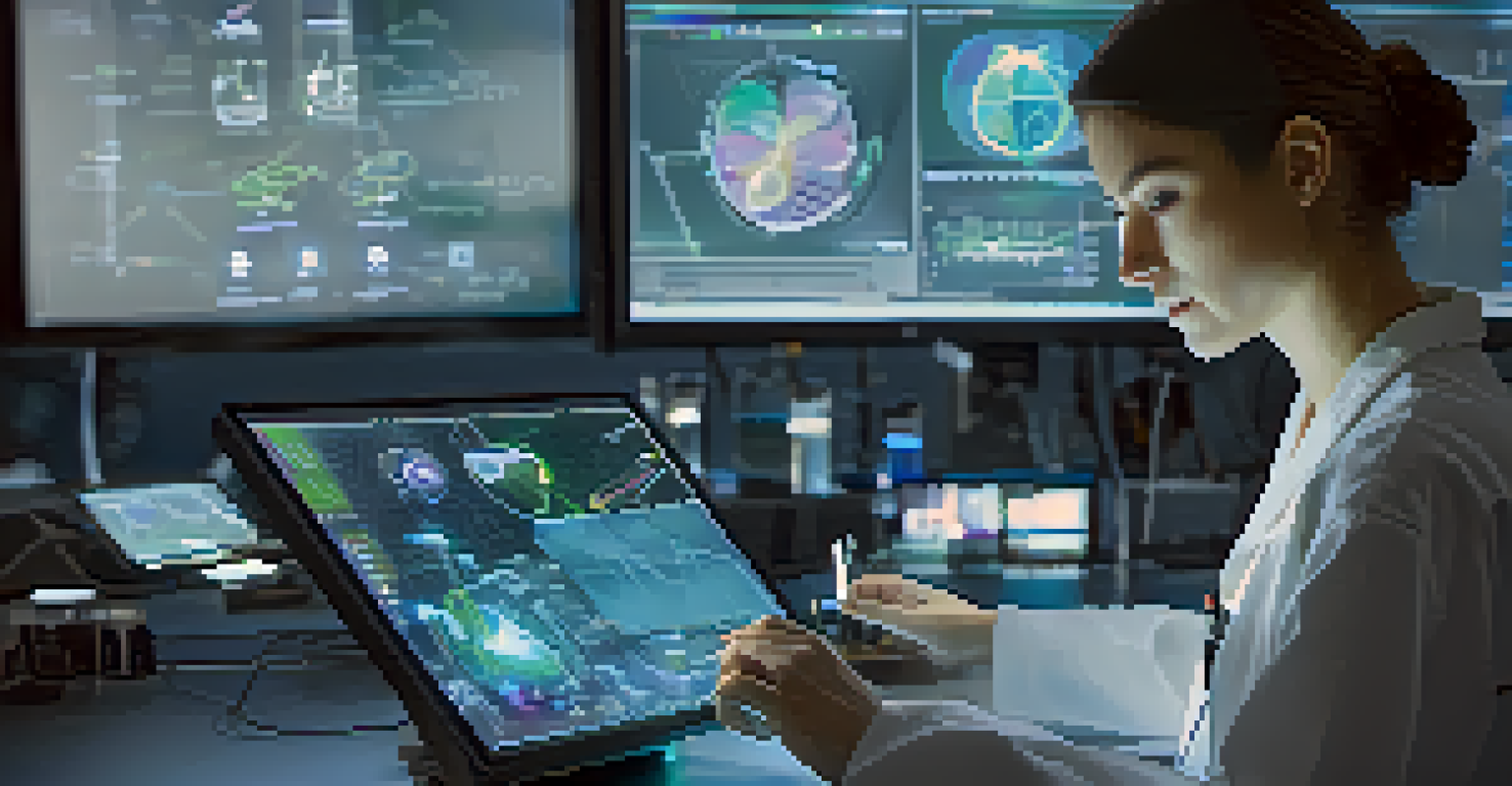MIT's Pioneering Research and Its Global Influence

The Legacy of Innovation at MIT: A Brief Overview
The Massachusetts Institute of Technology, or MIT, has long been synonymous with innovation. Founded in 1861, it has established itself as a global leader in scientific and technological research. From its early days, MIT focused on combining science and engineering to address real-world challenges, a vision that still drives its mission today.
The greatest danger in times of turbulence is not the turbulence; it is to act with yesterday's logic.
MIT's commitment to innovation can be seen in its emphasis on hands-on learning and interdisciplinary collaboration. By encouraging students and researchers to step outside traditional academic boundaries, the institute fosters an environment ripe for groundbreaking discoveries. This culture of innovation has led to numerous contributions that have reshaped industries and improved lives around the world.
Moreover, MIT’s influence extends beyond the classroom and laboratory. Its research initiatives often lead to the establishment of startups and collaborations with industry leaders, demonstrating a commitment to not only theoretical exploration but also practical application. This unique synergy has positioned MIT as a catalyst for technological progress on a global scale.
Key Areas of Research: From AI to Renewable Energy
At MIT, research spans a diverse array of fields, with artificial intelligence (AI) and renewable energy emerging as particularly transformative areas. The institute has played a pivotal role in advancing AI technologies, making significant strides in machine learning, robotics, and natural language processing. These advancements are not just academic; they are integrated into everyday technology, influencing sectors such as healthcare, finance, and transportation.

In parallel, MIT has been at the forefront of renewable energy research, addressing one of the most pressing challenges of our time: climate change. Researchers at MIT are developing innovative solutions to harness solar, wind, and other renewable sources, aiming to create sustainable energy systems for the future. The impact of this work resonates globally, as countries seek to reduce their carbon footprints and transition to cleaner energy.
MIT's Innovation Legacy
MIT has a longstanding commitment to innovation, combining science and engineering to tackle real-world challenges.
These two areas of focus exemplify MIT's approach to research—grounded in real-world applications and aimed at improving the human condition. As the institute continues to innovate in these fields, it inspires other institutions and countries to follow suit, amplifying its influence across the globe.
Collaboration Across Borders: MIT's Global Partnerships
Collaboration is at the heart of MIT's global influence, with numerous partnerships established with institutions around the world. These collaborations often focus on tackling global challenges, from health crises to environmental sustainability. By pooling resources and expertise, MIT and its partners can drive more impactful research and innovation.
Innovation distinguishes between a leader and a follower.
One notable example is the MIT-Portugal Program, which fosters research and innovation in areas such as advanced manufacturing and sustainable energy. This initiative not only benefits participating countries but also enriches the research landscape at MIT, creating a two-way exchange of knowledge and ideas. Such partnerships highlight MIT's commitment to being a global leader in addressing pressing issues.
Additionally, MIT's global outreach is evident through its various initiatives, such as the MIT International Science and Technology Initiatives (MISTI). These programs enable students and faculty to engage in research and projects abroad, furthering MIT's mission of making a difference worldwide. By cultivating these international relationships, MIT amplifies its impact and extends its influence far beyond its campus.
Fostering Future Leaders: Education at MIT
Education at MIT is about more than just textbooks and lectures; it's about nurturing the next generation of innovators. With a rigorous curriculum and an emphasis on hands-on learning, students are encouraged to think critically and creatively. The institute's unique approach prepares students not just to excel in their fields but to lead them.
Moreover, MIT's diverse student body brings together individuals from various backgrounds and cultures, fostering an environment of collaboration and innovation. This diversity enriches the educational experience, enabling students to learn from one another and approach problems from different perspectives. Such an inclusive atmosphere is crucial in developing well-rounded leaders who can navigate an increasingly complex world.
Global Research Collaborations
MIT's partnerships with international institutions enhance research efforts to address global issues like health and sustainability.
The support for entrepreneurship at MIT further enhances its educational offerings. Through programs like the Martin Trust Center for MIT Entrepreneurship, students are provided with the resources and mentorship needed to turn their ideas into viable ventures. This focus on entrepreneurship not only shapes individual careers but also contributes to economic growth and job creation globally.
Impact on Healthcare: Innovations that Save Lives
MIT's research contributions to healthcare are profound, with numerous innovations that have the potential to save lives. From groundbreaking medical devices to cutting-edge biotechnology, MIT researchers are at the forefront of transforming healthcare practices. Their work not only advances medical knowledge but also improves patient outcomes around the world.
One significant area of research is the development of wearable health technologies, which allow patients to monitor their health in real-time. These devices have revolutionized the way individuals manage chronic conditions, empowering them to take charge of their health. As these technologies become more widespread, the potential for improved healthcare accessibility and efficiency continues to grow.
Additionally, MIT's focus on data science in healthcare is paving the way for personalized medicine. By analyzing large datasets, researchers can identify trends and tailor treatments to individual patients, enhancing the effectiveness of interventions. This approach exemplifies MIT's commitment to using technology to address some of the most pressing health challenges faced globally.
Driving Economic Growth: MIT's Influence on Industry
MIT's research and innovation extend far beyond academia, significantly impacting the economy through collaborations with industry. The institute’s partnerships with businesses foster technological advancements that drive economic growth and job creation. By bridging the gap between research and industry, MIT plays a crucial role in translating ideas into products and services that benefit society.
One of the most notable examples of this influence is the MIT Media Lab, which has been a breeding ground for innovative startups. By providing resources and mentorship to budding entrepreneurs, the Media Lab has helped launch companies that have disrupted traditional industries. These entrepreneurial efforts not only contribute to economic progress but also inspire a new generation of innovators.
Impact on Healthcare and Economy
MIT's research leads to groundbreaking healthcare innovations and drives economic growth through industry collaborations.
Furthermore, MIT's commitment to public policy and economic research informs decision-making at various levels of government. By providing data-driven insights, MIT helps shape policies that can lead to sustainable economic development. This multifaceted approach to economic influence highlights MIT's role as a leader in fostering innovation and growth.
The Future of Research: MIT's Vision Ahead
As we look to the future, MIT remains committed to its mission of advancing knowledge and addressing global challenges. The institute is continually exploring new frontiers in research, from quantum computing to sustainable urban development. This forward-thinking approach ensures that MIT will remain at the cutting edge of innovation for years to come.
Moreover, MIT is increasingly focused on using technology for social good. Through initiatives that prioritize ethical considerations in research, the institute aims to ensure that advancements benefit humanity as a whole. This commitment to social responsibility is integral to MIT's vision of a better future, where technology serves as a tool for positive change.

Finally, MIT's dedication to fostering a diverse and inclusive community will play a vital role in shaping its future. By embracing different perspectives and ideas, the institute will continue to drive innovation and creativity. As MIT looks ahead, it is poised to remain a global leader in research and education, shaping the future for generations to come.